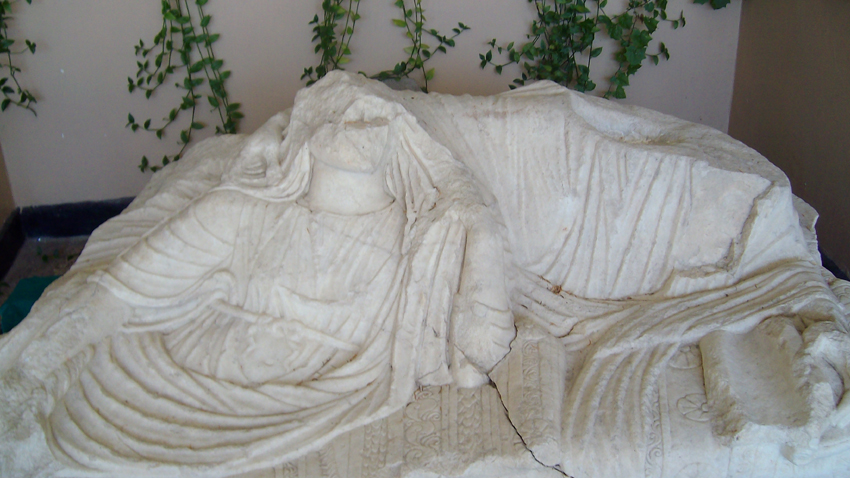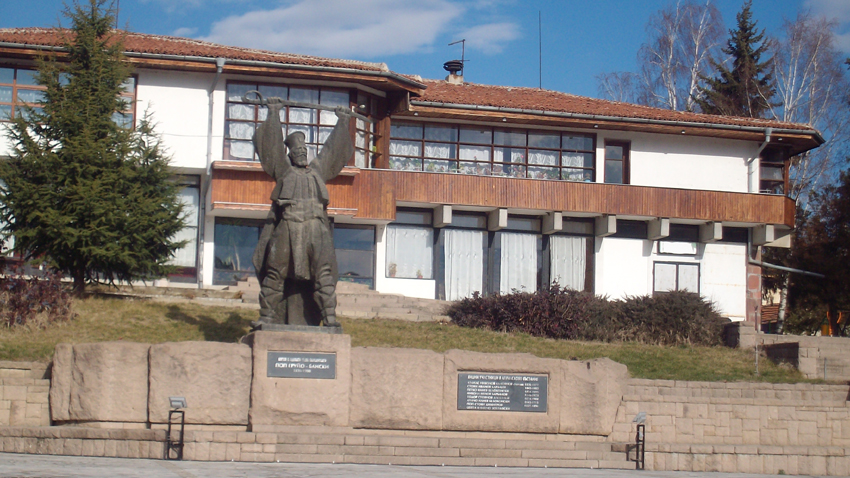Banya is located on the southern slopes of Sredna Gora Mountain close to the peak of Lisets. It spreads on both shores of Banska Louda Yana River. Ancient finds in the region including a stone hammer date back to the Paleolithic Era or the Old Stone Age. The first lasting settlement was founded here in the Classical Antiquity, by the local Thracian tribes. Archeological finds also provide evidence of Roman presence here.
“The village emerged owing to its warm mineral springs”, Radka Mouteva explains. “Local finds include plates with images of a Thracian horseman. Coins from the time of Philip II of Macedon have also been found here. However, the biggest find dates to 1987 when in the region of the village of Banya a Roman tomb was unearthed with a unique sarcophagus from 3-4 c. BC. Its lid is on display at the Village Hall. It is very beautiful depicting a scene in which a man and a woman lie together, embraced.”

Back in the Classical Antiquity, the Romans built a road to connect the village with Philippopoils (present-day Plovdiv) and with Constantinople. Off this road today, one can sight the remains of a military stronghold that the locals call Kaleto. It is also the spot where one of Banya’s hot springs comes out. In fact, the hot mineral springs are the emblem of the 850-strong village. Morello cherry orchards are another landmark. Mineral waters are beneficial for patients with disorders of the muscular and skeletal systems and there are many such patients from Bulgaria and abroad who visit the village for treatment. The local sanatorium offers an indoors mineral pool, but there is also an Olympic-sized outdoor swimming pool in the village. A few guesthouses have opened doors to meet rising tourist demand. It is also believed that the water from the spring called Ayazmoto can help in the treatment of eye diseases.
What about the lovely morello cherry orchards of Banya that look like beautiful dressed up girls in the spring? Some of them have been uprooted because old trees have to be replaced with… guess what, plum trees. “The cherry paradise is no longer the same”, Radka Mouteva admits. “In the past we picked tons of morello cherries here.” How do the residents of the village of Banya make a living today? Here, like in most Bulgarian villages, population has aged and young people are fewer than older generations.
“There is nothing that can keep young people here – they’ve got no chance of good jobs. During communism there were three holiday houses where they could work, because many people came here for treatment. Today, some work in the nearby town of Panagyurishte. Most young people emigrate – to Spain, Italy, Greece, Ireland, UK, Canada and USA. They are all young people aged below 30.”

A highlight in the village central area is the bronze monument of priest Grouyou Balkanski, an associate of the Apostle of Freedom Vasil Levski. He later took part in the 1876 April Uprising against the Turks. Priest Grouyou swore in the delegates in the assembly held in the locality of Oborishte where the decision to declare the uprising was made. He also wrote a chronicle of events in the region. Today the statue of Priest Grouyou with raised hands holding a sword reminds of the turbulent history of the village of Banya.
English version: Daniela Konstantinova
A country at the centre of ancient civilisations, whose historic sites sit amongst world-ranked Black Sea coastlines and snow-capped World Cup ski resorts, Bulgaria packs a lot of tourism attractions into its compact 111,000 square kilometres. And it's..
The Yantra River rises in the Balkan Mountains at 1,220 metres above sea level and descends northwards, meandering through picturesque valleys and gorges in central northern Bulgaria, crossing the towns of Gabrovo and Veliko Tarnovo. Shortly before it..
The village of Momchilovtsi, the Rhodopes, Pamporovo and the Smolyan region were present with a pavilion at a tourism exhibition this autumn in Ningbo, China. Speaking to BTA, Momchil Karaivanov, a representative of the Bulgarian-Chinese Society..

+359 2 9336 661
